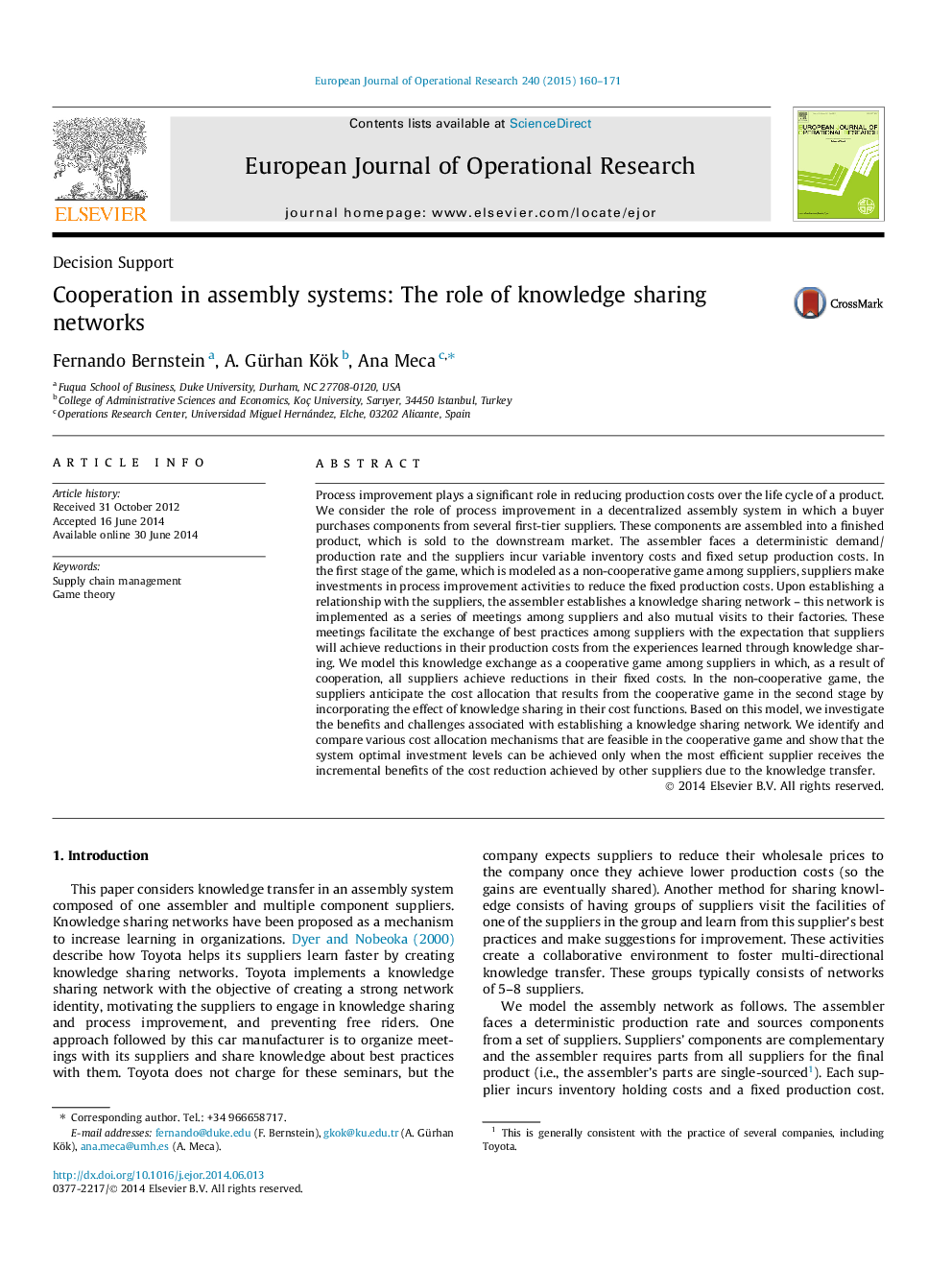| کد مقاله | کد نشریه | سال انتشار | مقاله انگلیسی | نسخه تمام متن |
|---|---|---|---|---|
| 6897162 | 1446017 | 2015 | 12 صفحه PDF | دانلود رایگان |
عنوان انگلیسی مقاله ISI
Cooperation in assembly systems: The role of knowledge sharing networks
ترجمه فارسی عنوان
همکاری در سیستم های مونتاژ: نقش شبکه های اشتراک دانش
دانلود مقاله + سفارش ترجمه
دانلود مقاله ISI انگلیسی
رایگان برای ایرانیان
کلمات کلیدی
مدیریت زنجیره تامین، نظریه بازی،
ترجمه چکیده
بهبود فرایند نقش مهمی در کاهش هزینه های تولید در طول عمر محصول ایفا می کند. ما نقش بهبود فرایند در یک سیستم مونتاژ غیر متمرکز را در نظر می گیریم که در آن یک خریدار اجزای چندین تامین کننده اول را خریداری می کند. این اجزاء به یک محصول به پایان رسید، که به بازار پایین بازار فروخته می شود. مونتاژ کننده با نرخ تقاضا / تولید قطعی مواجه است و تامین کنندگان هزینه های موجودی متغیر و هزینه های ثابت تولید ثابت را متحمل می شوند. در مرحله اول بازی، که به عنوان یک بازی غیر تعاونی در میان تامین کنندگان طراحی شده، تامین کنندگان سرمایه گذاری در فعالیت های بهبود روند برای کاهش هزینه های تولید ثابت است. پس از ایجاد ارتباط با تامین کنندگان، مونتاژ کننده یک شبکه به اشتراک گذاری دانش را ایجاد می کند - این شبکه به عنوان یک سری جلسات در میان تامین کنندگان و همچنین بازدید متقابل از کارخانه های خود انجام می شود. این جلسات، تبادل بهترین شیوه ها را در میان تامین کنندگان تسهیل می کند، انتظار می رود که تامین کنندگان به کاهش هزینه های تولید خود از تجارب ناشی از اشتراک دانش، دست یابند. ما این تبادل دانش را به عنوان بازی مشارکتی در میان تامین کنندگان مدل می کنیم که در نتیجه همکاری همه تامین کنندگان به کاهش هزینه های ثابت خود می رسند. در بازی غیر تعاونی، تامین کنندگان پیش بینی تخصیص هزینه ای را که از بازی تعاونی در مرحله دوم با استفاده از تاثیر اشتراک دانش در عملکرد هزینه های آنها حاصل می شود، پیش بینی می کند. بر اساس این مدل، ما مزایا و چالش های مرتبط با ایجاد یک شبکه به اشتراک گذاری دانش را بررسی می کنیم. ما شناسایی و مقایسه مکانیسم های مختلف تخصیص هزینه ای که در بازی های تعاونی امکان پذیر است نشان می دهد و نشان می دهد که سطح سرمایه گذاری بهینه را می توان تنها زمانی فراهم کرد که تامین کننده کارآمد دریافت مزایای افزایشی کاهش هزینه های دیگر تامین کنندگان را از طریق انتقال دانش به دست آورد.
موضوعات مرتبط
مهندسی و علوم پایه
مهندسی کامپیوتر
علوم کامپیوتر (عمومی)
چکیده انگلیسی
Process improvement plays a significant role in reducing production costs over the life cycle of a product. We consider the role of process improvement in a decentralized assembly system in which a buyer purchases components from several first-tier suppliers. These components are assembled into a finished product, which is sold to the downstream market. The assembler faces a deterministic demand/production rate and the suppliers incur variable inventory costs and fixed setup production costs. In the first stage of the game, which is modeled as a non-cooperative game among suppliers, suppliers make investments in process improvement activities to reduce the fixed production costs. Upon establishing a relationship with the suppliers, the assembler establishes a knowledge sharing network - this network is implemented as a series of meetings among suppliers and also mutual visits to their factories. These meetings facilitate the exchange of best practices among suppliers with the expectation that suppliers will achieve reductions in their production costs from the experiences learned through knowledge sharing. We model this knowledge exchange as a cooperative game among suppliers in which, as a result of cooperation, all suppliers achieve reductions in their fixed costs. In the non-cooperative game, the suppliers anticipate the cost allocation that results from the cooperative game in the second stage by incorporating the effect of knowledge sharing in their cost functions. Based on this model, we investigate the benefits and challenges associated with establishing a knowledge sharing network. We identify and compare various cost allocation mechanisms that are feasible in the cooperative game and show that the system optimal investment levels can be achieved only when the most efficient supplier receives the incremental benefits of the cost reduction achieved by other suppliers due to the knowledge transfer.
ناشر
Database: Elsevier - ScienceDirect (ساینس دایرکت)
Journal: European Journal of Operational Research - Volume 240, Issue 1, 1 January 2015, Pages 160-171
Journal: European Journal of Operational Research - Volume 240, Issue 1, 1 January 2015, Pages 160-171
نویسندگان
Fernando Bernstein, A. Gürhan Kök, Ana Meca,
